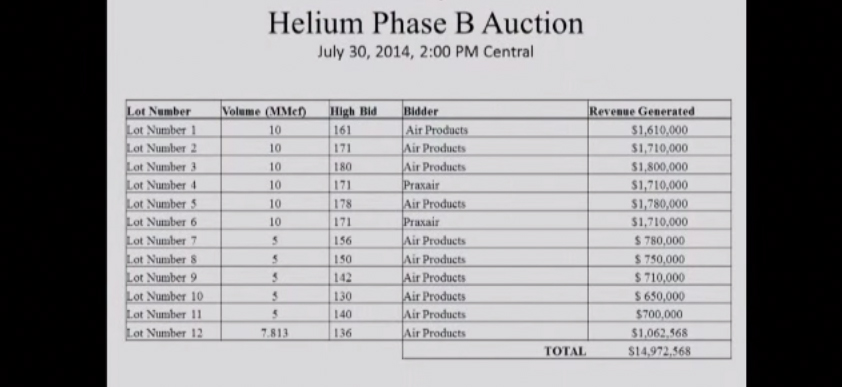The first federal helium auction of one year ago, which you can watch in its entirety above, was publicly labeled a huge success, generating nearly $15 million in revenue for the U.S. Treasury. But not everyone was thrilled and complaints were recently lobbied at a hearing over the implementation of new helium legislation.
The Bureau of Land Management (BLM) held the first auction of Federal helium on July 30, 2014 under the terms of the Helium Stewardship Act (HSA) of 2013, which mandated that the Federal Helium Reserve be shut down by September 30, 2021 and all of its property, equipment, and interest sold and/or disposed of in order to transition to a privatized system.
The helium in the first auction was sold in 12 lots and generated $14,972,568.
Afterward, BLM Amarillo Field Office Manager Robert Jolley said the “auction was successful in achieving a key objective of the HSA, which is to maximize the value of federal helium through a market-driven process. This, in turn, is expected to incentivize private producers to develop other sources of helium to supply the market when the Federal Helium Reserve is fully drawn down.”
Doug Lamborn, chairman of the Energy and Mineral Resources Subcommittee of the House Natural Resources Committee, expressed a different opinion, calling the helium auction “a resounding failure” due to the “severe lack of competition.”
Lamborn’s comments were directed at what the BLM failed to report in their press release, which was that of the 13 companies present at the inaugural helium auction, only two (Air Products and Praxair) purchased the entire lot of helium.
Some representatives of the 11 losing companies shared Lamborn’s sentiment.
The Helium Stewardship Act was intended to transition to the privatization of the federal helium reserve in a manner that was competitive, so that stability of the helium market was maintained. It added that companies that purchased helium but lacked refineries would get access to refineries at fair rental rates.
However, after 11 of 13 the companies that were present failed to win a single bid, many came to agree that the BLM’s sales process needed reform before future helium auctions. Among the potential concerns of just one or two companies buying up all the helium is a monopolized market in which the many that don’t have it are held hostage to the rates of the few that do.
These arguments were made before the Energy and Mineral Resources Subcommittee of the House Natural Resources Committee at the July 8 hearing.
Among those present was William Halperin, a professor of Physics at Northwestern University, who stated that helium is irreplaceable in fields like his own. “Helium is the only ultra-cold liquid,” Halperin testified. “It has unique, important properties like superfluidity and there is NO substitute. Our work has enabled critical discoveries in medicine, national security, computer technology and fundamental science. In some cases our breakthroughs have spawned billion-dollar industries.”
He added that the rapidly increasing cost of helium is already leading to research department lay-offs, and even went on to suggest that Congress take action to keep the helium reserve open:
“This Subcommittee should consider possible legislative fixes to keep the helium reserve open beyond 2021. The benefits to the research community could be immeasurable. The helium reserve administered by the BLM is a unique resource. It can protect scientific research from the extreme volatility of the helium market that has been abundantly manifest in the past five years. Stability and affordability of the helium supply chain for government sponsored scientific research can be achieved, if the federal helium reserve is maintained.”
However, Halperin’s suggestion seems like more than a long shot.
Just this week, the Senate Energy and Natural Resources Committee released this bipartisan draft of an all-encompassing energy policy bill that if enacted, would repeal the Federal government’s reservation of the first right to helium located on leased lands.
The next helium auction is a Phase B auction slated for August 18, with a subsequent helium sale on August 24.
Source: Bureau of Land Management, Senate Energy and Natural Resources Committee, The House Natural Resources Committee Energy & Mineral Resources Subcommittee, Office of the Federal Register


